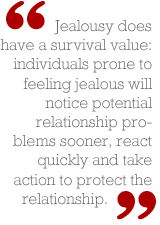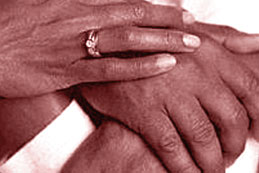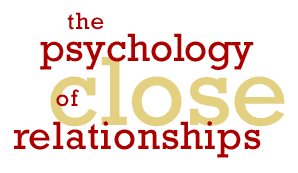




|
Jealousy, Commitment's Darker Side
Just as the euphoria we associate with finding an intimate other can degenerate into profound depression and dysphoria, so to can secure
commitment devolve into jealousy. As discussed in the previous session,
psychologists have identified six patterns or "styles of love" that correspond roughly to feelings for which the ancient Greeks used
distinctive terms. A possessive, excitable style of love seems to correspond to what the Greeks called mania, a term used today
to refer to hyperactivity, arousal and emotional extremes, both euphoric and angry. Manic love is especially insecure and possessive.
The object of manic "love" can't win in the struggle to be trusted:
Manic Lover: "Where are you going?"
Targeted Partner: "Just to the store."
ML: "Okay, I'll come along."
TP: "No, really, I'll be right back."
ML: "If you'll be right back, why can't I come? Are you meeting someone?"
TP: "I'm not meeting anyone! You really ought to trust me."
ML: "It's tough to trust you if you don't want me with you!"
And so on.
Jealousy drives us to extreme behavior. We agonize over imagined threats, make fools of ourselves, accuse and hurt the ones we
supposedly love -- and those we see or imagine to be our rivals. Psychologists define jealousy as experiencing a threat to a
relationship. This experience can be real or imagined: you can feel jealous because your partner is being friendly to someone, feeling
wrongly threatened. Or you can fail to be jealous because you miss noticing a genuine threat, maybe because your partner is deceiving
you, planning to leave without giving you a chance to challenge your rival or make things better.
Jealousy does have a survival value: individuals prone to feeling jealous will notice potential relationship problems sooner, react
quickly and take action to protect the relationship. Research by evolutionary psychologists argues that early humans protected their
relationships better than those who neither noticed nor responded to real threats, thus passing any jealousy-prone genes on to more
offspring than their more accepting, trusting peers.
How Men and Women Experience Jealousy
The threat underlying jealousy is that a relationship will be violated and destroyed. Specifically, if a relationship is based on
exclusivity -- and agreement not to have other partners, emotionally or sexually -- any interloper violates the partners' contract with
each other. What is essential in this contract? Research has identified several gender differences in the experience of jealousy:
Trigger: Men are jealous about partners' sexual liaisons; women are more jealous about outside emotional commitments.
Reaction: Men deny that they are "jealous," while women acknowledge it.
Emotion: When jealous, men feel angry; women get depressed.
Target: Men blame their rivals; women blame themselves.
Coping: Men make themselves feel better by attacking their rivals, or by having a fling of their own. Women try to improve their own attractiveness and to strengthen the
relationship itself.
First identified in the 1970s, these gender differences have not always been confirmed in subsequent research but they do hint at what each sex most seeks to protect.
If women most fear their male partners' emotional -- not sexual -- involvement
with another, perhaps they themselves most cherish emotional closeness. If men fear their female partners are having sex
elsewhere, it's a very different sort of intimacy they seek to protect. Different sorts of intimacy mean different goals, rewards
and behavior patterns. The better we understand jealousy, then, the better we will understand what we seek and find in closeness to others.
Recognizing and Dealing With Jealousy Constructively
The ugliest aspect of jealousy may be its possessiveness. This is the essence of manic of possessive 'love': to regard one's partner as an object to be controlled, a prize one has earned and is entitled to
own. Jealousy may be a natural response to threat, but it is not a healthy basis for intimacy. In terms of well-being, jealousy is like a bruise. A bruise is your body's reaction to a blow or injury. But being covered with bruises does
not make you stronger; it only makes you look beat up! Likewise, feeling jealous is a natural reaction to feeling your relationship is threatened, but constant jealousy does not save your relationship, it only weakens and might destroy it.
Constant jealousy is no way to live and no way to love. Jealousy provokes and hurts us, revealing us at our most insecure and selfish.
Somehow, lovers must find a way to recognize and deal with jealousy in ways that don't destroy intimacy.
Psychologists recommend that first, jealousy be recognized for what it is: insecurity and possessiveness.
Partners who pick fights or
pitch fits when you are friendly with someone else are not complimenting you -- they are showing you previews of likely future
behavior: inability to like themselves; insistence on "property rights" over you, perhaps a desire to control you; expressing
feelings of rage or depression to get their way. Recognize jealousy for what it is, as Shakespeare puts it in "Othello," more "green-ey'd
monster" than magic.

|



